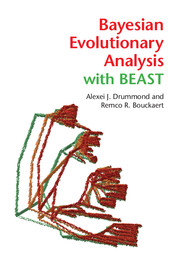Book contents
- Frontmatter
- Contents
- Preface
- Acknowledgements
- Summary of most significant capabilities of BEAST 2
- Part I Theory
- Part II Practice
- 6 Bayesian evolutionary analysis by sampling trees
- 7 Setting up and running a phylogenetic analysis
- 8 Estimating species trees from multilocus data
- 9 Advanced analysis
- 10 Posterior analysis and post-processing
- 11 Exploring phylogenetic tree space
- Part III Programming
- References
- Index of authors
- Index of subjects
6 - Bayesian evolutionary analysis by sampling trees
from Part II - Practice
Published online by Cambridge University Press: 05 October 2015
- Frontmatter
- Contents
- Preface
- Acknowledgements
- Summary of most significant capabilities of BEAST 2
- Part I Theory
- Part II Practice
- 6 Bayesian evolutionary analysis by sampling trees
- 7 Setting up and running a phylogenetic analysis
- 8 Estimating species trees from multilocus data
- 9 Advanced analysis
- 10 Posterior analysis and post-processing
- 11 Exploring phylogenetic tree space
- Part III Programming
- References
- Index of authors
- Index of subjects
Summary
Molecular sequences, morphological measurements, geographic distributions, fossil and subfossil remains all provide a wealth of potential information about the evolutionary history of life on Earth, and the processes that have generated Earth's biodiversity. One of the challenges of modern evolutionary biology is the integration of these different data sources to address evolutionary hypotheses over the full range of spatial and temporal scales. Evolutionary biology has seen a transition from being a descriptive, mathematical science to a statistical and computational science. This transformation began first from an explosion of molecular sequence data with a parallel development of computational tools for their analysis. However, increasingly this transformation can be observed in other aspects of evolutionary biology where large global databases of other sources of information, such as fossils, geographical distributions and population history, are being curated and made publicly available.
The major goal of the developers of BEAST has been to design and build software and programming libraries that enable integration and statistical analysis of all these heterogeneous data sources. After years of development BEAST is now a robust and popular open source platform (http://beast2.org). The BEAST software is a popular Markov chain Monte Carlo (MCMC) sampler for phylogenetic models and has been downloaded tens of thousands of times. The program website for version 2 is http:// beast2.org. The BEAST users’ group (http://groups.google.com/group/beast-users) had over 2300 members as of July 2014. The original BEAST software article (Drummond and Rambaut 2007) is the most viewed paper in BMC Evolutionary Biology of all time (>68 000 views).
An underappreciated role in modern scientific research is the production of high-quality and robust software systems that provide for data analysis, hypothesis testing and parameter estimation. Typically development of such software was traditionally done without major support from research funding, because it is perceived to be a technical or engineering task that does not directly increase our scientific knowledge. However, we think this view is short-sighted as software like BEAST is an enabling technology that improves the level of statistical sophistication in evolutionary analyses and enables researchers to pose questions that could not previously be formally asked of the available data.
This chapter introduces the BEAST software for Bayesian evolutionary analysis through a simple step-by-step exercise.
Information
- Type
- Chapter
- Information
- Bayesian Evolutionary Analysis with BEAST , pp. 79 - 96Publisher: Cambridge University PressPrint publication year: 2015
Accessibility standard: Unknown
Why this information is here
This section outlines the accessibility features of this content - including support for screen readers, full keyboard navigation and high-contrast display options. This may not be relevant for you.Accessibility Information
- 5
- Cited by
